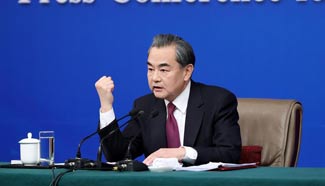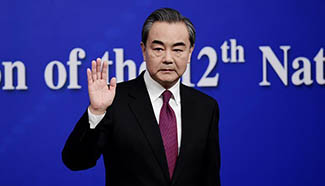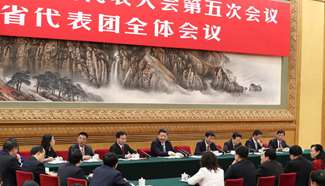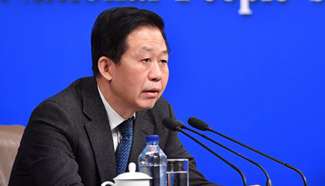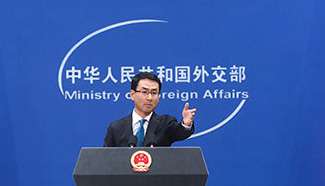BEIJING, March 8 (Xinhua) -- National lawmakers on Wednesday started to deliberate draft general provisions of civil law, which, if adopted, will bring the country one step closer to a long-absent civil code.
With the draft submitted to the ongoing annual session of the National People's Congress (NPC), China's top legislature, the country is nearing the end of its crucial first step toward a civil code: laying down basic principles.
Last year, the draft went through three readings at the bi-monthly sessions of the NPC Standing Committee. It is rare for a draft law not to be passed after three readings.
After the adoption of the general provisions, lawmakers will step up work on compiling individual books on property, contract and marriage, among others, which will be integrated into a unified code.
According to the legislation plan, the code will be enacted in 2020.
Compiling a civil code, dubbed as "an encyclopedia on social life" which regulates personal and property relations, will help "better protect the people's immediate interests, improve state governance, maintain market order, ensure trading security, and promote the sound development of socialist market economy," Li Jianguo, vice chairman of the NPC Standing Committee, said while explaining the draft Wednesday at an NPC plenary meeting.
ADAPTING TO NEW ERA
The draft, based on the General Principles of Civil Law adopted in 1986,deals with a variety of issues, ranging from ecological conservation to property protection and the guardianship system.
Existing provisions in the General Principles have been revised and new ones added in line with new conditions in social and economic activities.
The draft establishes a "green" principle, stipulating that in their civil activities, civil subjects must be aware of the need to save resources and protect the environment.
This reflects the country's new development concepts and the fact that China is a populous country that has to strike a balance between people and the environment for a long time to come, Li said.
"Legislative efforts are needed to ensure civil subjects better fulfill their obligations in environmental protection," said national lawmaker and jurist Wu Qing.
Fetuses that require protection for the succession of estates and reception of donations shall be deemed as having the capacity for civil law rights, according to the draft.
"This is a step forward. Rights of a life without capacity for conduct still need protecting," said Shen Guoming, deputy head of the China Society of Jurisprudence.
The draft lowers the statutory age limit of minors with limited capacity for civil conduct from 10 to six years, for the purpose of attaching more attention to minors' own discretion.
The draft also highlights the protection of online virtual assets and data, as incidents of personal information leakage have increased in recent years.
In addition, the draft adds provisions on rural economic collectives and villagers' committees, among others, to help them better participate in civil life, and protect the members' legitimate rights and interests.
"Each and every provision embodies the will of the people," said national lawmaker Sun Xianzhong, deputy head of the China Civil Law Society, who has spent years pushing for a civil code of China.
TIME RIPE FOR CIVIL CODE
The road towards a civil code, a dream for generations of Chinese, has been bumpy.
For millennia, civil rights and civil code were virtually unheard of for Chinese living under imperial autocracy. It was until late Qing Dynasty that the concept of civil code was first put forward, followed by a failed attempt by the Qing government to introduce a code.
Since the People's Republic of China was founded in 1949, the central authority has strived to build a modern country under the rule of law, of which a civil code is an integral part.
In 1954, 1962, 1979 and 2001, China made separate attempts to draft a civil law, only to halt due to political turmoil and other reasons.
For example, the second attempt was interrupted by the chaotic Cultural Revolution (1966-1976), a dark decade in which human rights were trampled and laws could hardly protect anyone.
In 1986, the General Principles of Civil Law was enacted, establishing basic principles for protecting civil rights and interests, and regulating civil relations.
A draft civil law was submitted to the top legislature for the first reading in December 2002, but then shelved for its complexity and difference of opinions over it.
Nonetheless, the General Principles and other separate civil laws promulgated over the past decades, including the Property Law, the Tort Liability Law and Inheritance Law, have laid good groundwork for a civil code.
In October 2014, the Communist Party of China decided at a key meeting to compile a civil code. It is people's congresses that translate the Party's resolutions into the will of the state through legislative procedures.
The legislative task has since been treated as a necessary move to perfect the country's socialist legal system with Chinese characteristics, and significant in modernizing state governance.
In March 2015, the drafting of the general provisions started, marking the beginning of China's journey to a civil code of its own.
According to the top legislature, China's civil code will be born out of the country's realities, target problems in China, address Chinese people's concerns and needs, as well as embody Chinese culture, traditions and values.
One cardinal principle for compiling the civil code is weaving socialist core values, including equality, justice and amicability, into the whole process.
In this spirit, for example, the draft stipulates that a person shall not bear civil responsibilities if he acts voluntarily to help another in emergency and inflicts losses on the one being helped, a move to encourage helping others in danger and protect those who do.



